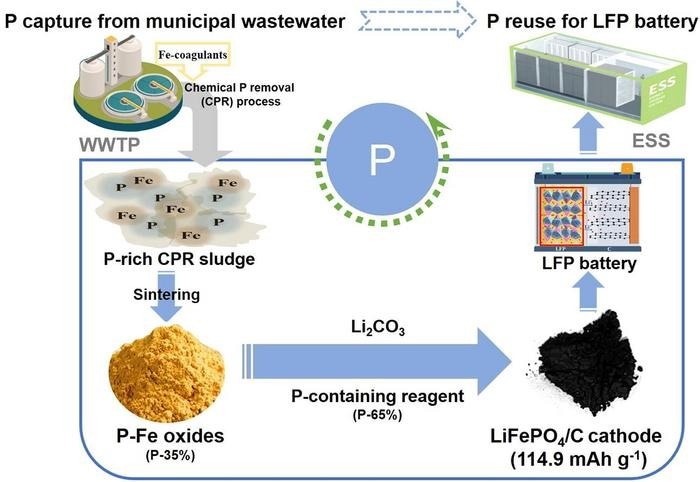A research team from the Shenzhen Engineering Research Laboratory for Sludge and Food Waste Treatment and Resource Recovery has presented a ground-breaking approach to address the pressing worldwide issue of phosphorus (P) scarcity in a recent study published in Engineering.
 Graphical abstract. Image Credit: Yijiao Chang et al.
Graphical abstract. Image Credit: Yijiao Chang et al.
Their novel technology uses municipal wastewater to create phosphorus, which is required to produce lithium iron phosphate (LiFePO4) batteries, a major component in the rapidly expanding electric vehicle industry.
As the demand for LiFePO4 batteries grows owing to their use in lithium-ion batteries (LIBs), phosphorus scarcity has become a major issue. Phosphorus is required to provide high-performance cathode materials for these batteries.
The researchers developed an environmentally friendly, acceptable, and cost-effective approach that involves extracting phosphorus from municipal wastewater and converting it into a useful resource for battery production.
Transforming Waste into Wealth: The New Recovery Method
The team's unique strategy incorporates using sludge from Fe-coagulant-based chemical phosphorus removal (CPR) operations in wastewater treatment. This phosphorus- and iron-rich sludge is sintered and acid-washed to produce purified P-Fe oxides (Fe2.1P1.0O5.6). These oxides are then used to replace up to 35% of the FePO4 reagent used to produce LiFePO4 cathodes.
The resultant carbon-coated LiFePO4 (LiFePO4/C) cathodes have excellent performance characteristics. They have a specific discharge capacity of 114.9 mA·h·g−1 at 17 mA·g−1 and a remarkable cycle stability of 99.2% after 100 cycles. This improved performance is ascribed to the beneficial impurities in sludge, which contribute to a more stable crystal structure in the cathodes.
Economic and Environmental Impact
This novel technology recovers 100% of the phosphorus from CPR sludge into high-value LiFePO4/C cathodes, in contrast to conventional approaches that mainly yield P-fertilizers. This method provides a sustainable approach to managing urban waste and addresses the worldwide phosphorus scarcity.
The economic gains are enormous. The researchers estimated that phosphorus recovered from municipal wastewater may fulfill up to 35% of the phosphorus needed in China's LIBs industry. This establishes the novel recovery approach as a cost-effective alternative to traditional phosphorus reuse methods.
A Pathway to Sustainable Development
The relevance of this study goes beyond technological improvement. The team's technique promotes environmental sustainability as well as the global quest for greener energy solutions by transforming wastewater sludge into an important component for clean energy storage. The recovery process minimizes urban waste, lessens reliance on finite phosphorus resources, and aids in developing sustainable technology.
It has the dual advantage of alleviating phosphorus scarcity while also improving the performance of LiFePO4 batteries, thus facilitating the transition to a more sustainable and energy-efficient future.
The study was authored by Yijiao Chang, Xuan Wang, Bolin Zhao, Anjie Li, Yiru Wu, Bohua Wen, Bing Li, Xiao-yan Li, Lin Lin.
Journal Reference:
Chang, Y., et. al. (2024) Green and high-yield recovery of phosphorus from municipal wastewater for LiFePO4 batteries. Engineering. doi:10.1016/j.eng.2024.05.018